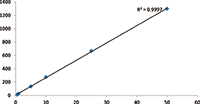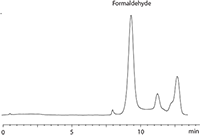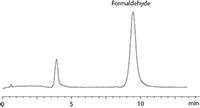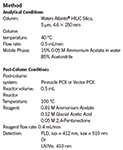Analysis of Formaldehyde
Special Issues
Formaldehyde is widely used in manufacturing of building materials, cars, plywood, polymers, glues, and adhesives. It is also commonly used in household items as a preservative and disinfectant. Due to high toxicity and suspected carcinogenicity, products are tested to determine free formaldehyde content and ensure the safety of personal care products and other items. Free formaldehyde testing is also important to monitor production of resins and other polymers and to ensure the quality of final materials.

HPLC method with post-column derivatization allows for quantifying free formaldehyde in a wide range of products and materials, from shampoos to emulsion polymers and phenolic resins. The method is simple, selective, and very sensitive. Potential interferences are either separated from formaldehyde on HPLC column or don't react with post-column reagent and so are not interfering with the detection.




Pickering Laboratories, Inc.
1280 Space Park Way, Mountain View, CA 94043
tel. (800) 654-3330, (650) 694-6700com
Website: www.pickeringlabs.com

The Benefits of Custom Bonded Silica
April 1st 2025Not all chromatography resins are created equal. Off-the-shelf chromatography resins might not always meet the rigorous purification requirements of biopharmaceutical manufacturing. Custom bonded silica from Grace can address a wide range of separation challenges, leading to real performance improvements. Discover more about the latest innovations in chromatography silica from Grace, including VYDAC® and DAVISIL®.
5 Things to Consider When Selecting a Chromatography Silica
April 1st 2025Particularly in the pharmaceutical industry, drug purity isn’t just a goal – it’s essential for achieving safety, stability and efficacy. However, purification is easier said than done, especially with challenging molecules like DNA and RNA “oligonucleotides,” due in large part to their diversity and the range of impurities that can be generated during production. Enter DAVISIL® chromatographic silica, with a wide range of pore diameters and particle sizes to meet your specific application, performance and sustainability requirements. Before you choose the chromatography resin for your next purification application, take a look at these 5 considerations.
Automating Protein Purification: Efficiency, Yield, and Reproducibility
March 27th 2025Recent advancements in automated protein purification stress the importance of efficiency, scalability, and yield consistency. This eBook compares different purification platforms, highlighting their impact on downstream applications and demonstrating how automation enhances throughput and process control.
MilliporeSigma: Ultrapure Water for Sensitive LC-MS Analysis of Pesticides
March 25th 2025The aim of the study was to illustrate the efficiency of Milli-Q® water purification systems in eliminating pesticides from tap water, thereby producing and delivering reliable and consistent-quality ultrapure water suitable for pesticides analysis














